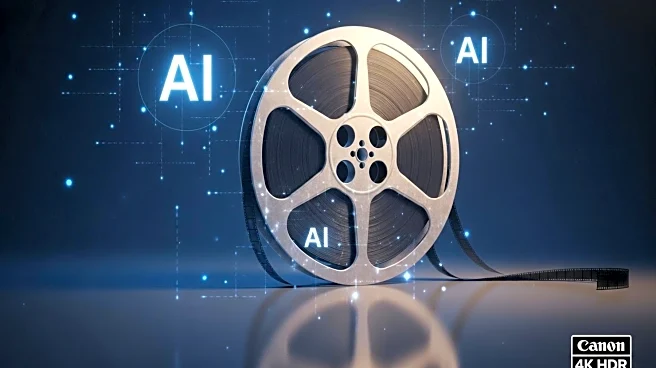What's Happening?
Edward Saatchi, CEO of the Amazon-backed startup Fable, has announced a new initiative using artificial intelligence to restore lost footage from Orson Welles' 1942 film, 'The Magnificent Ambersons.' This project, described as 'non-commercial and academic,' aims to reconstruct the film as closely as possible to Welles' original vision. The film, which was released in a heavily edited form by Warner Bros., had about 43 minutes of footage destroyed. Fable's interactive platform, Showrunner, is spearheading this effort, with filmmaker and researcher Brian Rose working to piece together the missing frames using a combination of 3D set reconstructions and documentary evidence. Saatchi's comments on CNBC highlighted the potential of AI to transform creativity, suggesting that AI could generate new entertainment content alongside traditional human-created works.
Why It's Important?
The use of AI in restoring lost film footage represents a significant development in the intersection of technology and the arts. This initiative could pave the way for similar projects, potentially revolutionizing how lost or damaged cultural artifacts are preserved and experienced. The project also raises questions about the role of AI in creative industries, with potential implications for filmmakers, studios, and audiences. While some in the creative community express concern over AI's impact on jobs, Saatchi argues that AI could become a major revenue source for studios, offering new ways to monetize intellectual property. This development could lead to a shift in how content is produced and consumed, with AI-generated scenes and features becoming part of mainstream entertainment.
What's Next?
The project is expected to continue over the next two years, with the goal of achieving a reconstruction as close as possible to Welles' original vision. As the project progresses, it may influence how studios and content creators approach the integration of AI in their work. The potential for AI to generate new scenes and features could lead to new business models and revenue streams for the entertainment industry. Stakeholders, including filmmakers and writers, may need to adapt to these changes, potentially negotiating new agreements to ensure they benefit from AI-generated content. The project's success could also encourage other studios to explore similar initiatives, further integrating AI into the creative process.
Beyond the Headlines
The ethical implications of using AI in creative processes are significant. As AI becomes more involved in content creation, questions about authorship, intellectual property rights, and the preservation of artistic intent will become increasingly important. The project also highlights the potential for AI to democratize creativity, allowing more people to participate in the creation and enjoyment of art. However, it also raises concerns about the potential loss of human touch in creative works and the impact on traditional artistic practices. As AI continues to evolve, society will need to navigate these complex issues, balancing innovation with the preservation of cultural heritage.








